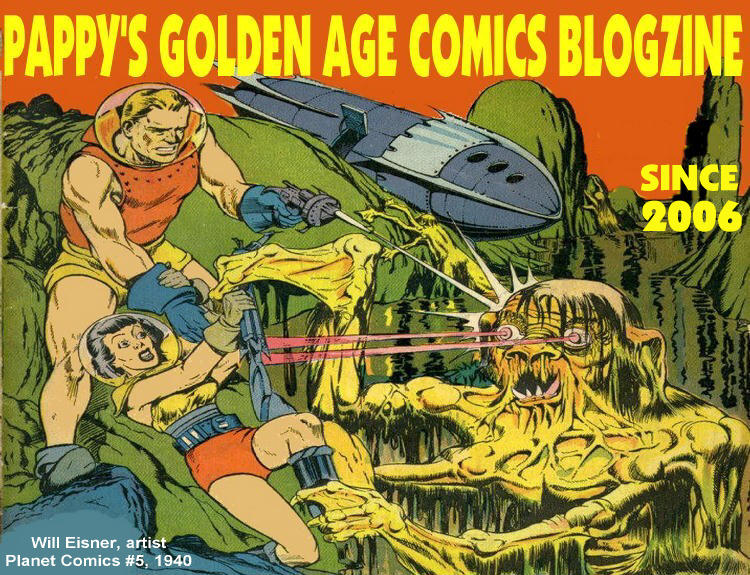“Blooperman” is an indirect satire on Superman. This story from Frankenstein #8 (1947), drawn (and presumably written) by Dick Briefer, is mainly about astral projection, and Blooperman’s creators, "Joe Seagull and Jerry Shoestring” promoting their creation by using the monster's newly found ability to levitate.
About the time this was published the real Jerry and Joe (Siegel and Shuster) lost their lawsuit to regain the rights to Superman, and their byline disappeared from Superman stories for 30 years. It's an often told tale for creators about being careful what one is signing away when endorsing a check.
Back to astral projection. It is not well known, but I have the ability to leave my body and go wherever I want to go. It can be handy. As a matter of fact, I am hovering invisibly behind you while you read this. So...BOO!










6 comments:
I note that the final gag is a sterilization of the fantasy of a man using invisibility to molest women.
Over-all, this story reads like an episode of Count Screwloose by Milt Gross.
Reäcting yester-day to the death of Leonard Cohen, I found a video of him singing “Suzanne” (so that I could post a link to Facebook). The clip that I found began with him explaining that he had lost the rights to the song by signing what he were told were a standard artist's contract.
This is a nice story -- comedic stories work well when there are unrelated elements -- the astral traveling suddenly turns into a super-man riff being the example here.
I have no idea if Briefer had any beef with Siegel and Shuster, but this didn't seem like a gentle ribbing, to me at least. Could have been, and might be something related to the time of this story.
Daniel, why not a Milt Gross feel to it? Briefer's comedy style reminds me of the screwball cartoonists.
I recall many stories of artists and musicians ripped off by record labels, payola and disadvantageous contracts for the artists. I think what he may have lost in royalties for "Suzanne" Cohen may have made up for later by gaining wisdom of the sharks in that industry. I'll bet he didn't make a mistake like that again.
Brian, I don't know if Dick Briefer had a problem with Siegel and Shuster, but probably had a problem with publishers exploiting their talent.
Even Al Capp took a swipe at the Superman Siegel/Shuster/DC Comics suit with a sequence in "Li'l Abner" about Mackintosh and Baldwin ("two good apples"), creators of Jack Jawbreaker.
Yes, there is an element of screwball humor across Briefer's comedic work, but I just hadn't given much thought to that until this story.
As to Siegel and Shuster, may I suggest that Briefer may have been obliquely making a claim about their having trouble getting people to see their case?
Sadly, Cohen was later terribly victimized by another manager, who out-and-out stole a great deal from him. He won a court judgment against her, but I don't believe that he made much-if-any recovery.
Daniel, being betrayed by managers and accountants seems to be a pattern in show business. Or any other business where one depends on someone else to handle the money. I have had former coworkers whose job was to handle money fired for stealing. I have never gotten the chance to ask them how they planned to get away with the theft. My guess is they thought they would pay it back, but got caught.
Post a Comment